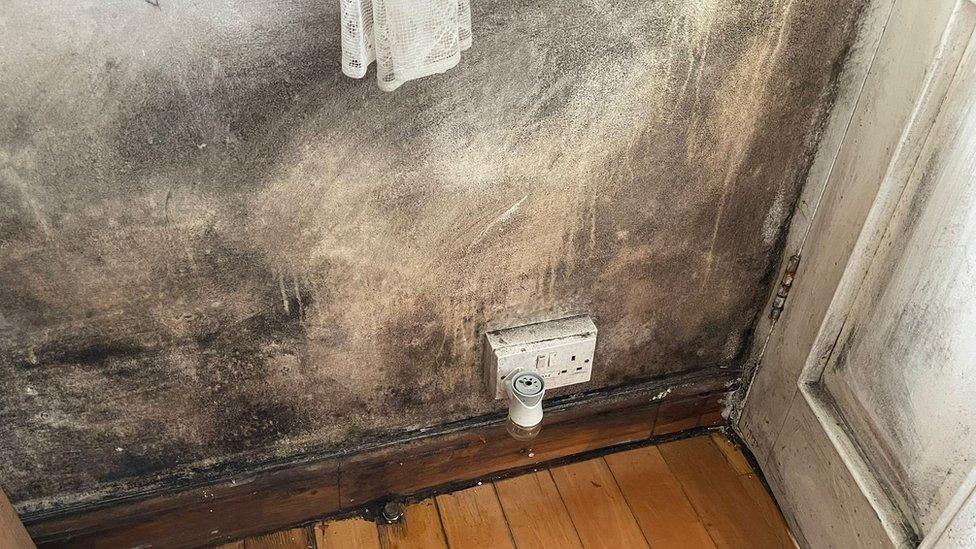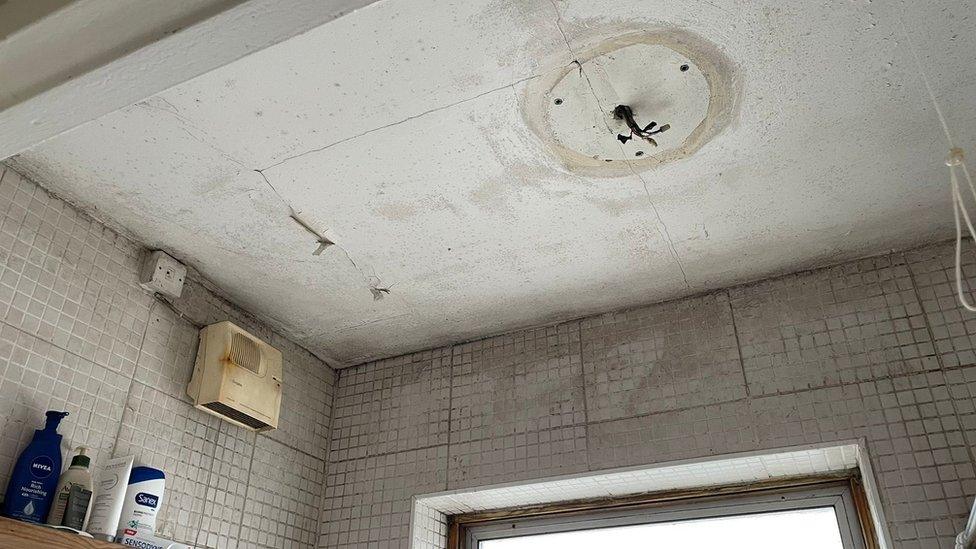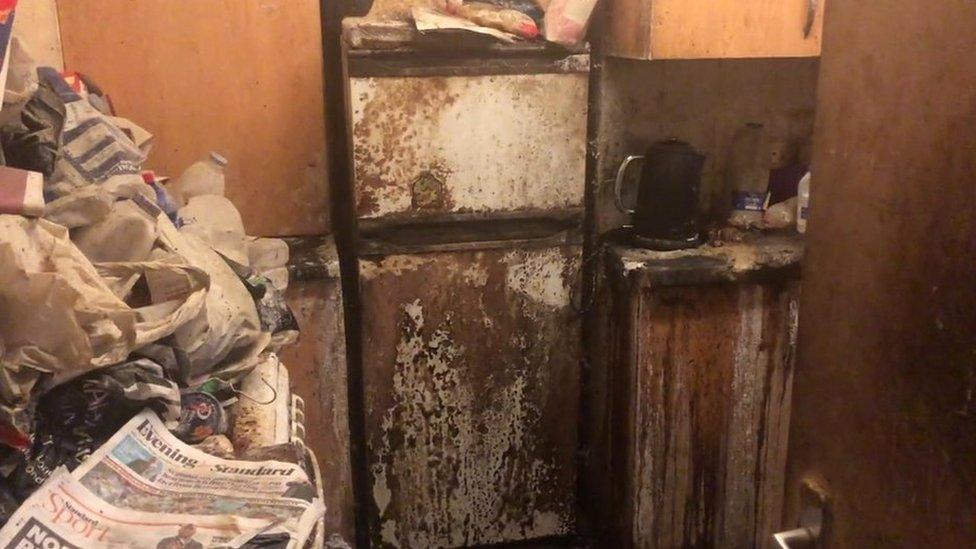Private renters stuck in dangerous homes 'failed' by councils
- Published
Watch: Paul Smith, from Blackpool, shows a crumbling ceiling in his rented flat
Tenants who complain of dangerous or potentially deadly faults in privately rented homes are being let down by councils, a BBC investigation suggests.
When landlords fail to fix hazards - including serious faults that pose an immediate risk to health - councils in England have a legal duty to act.
But BBC News found the number of times councils use enforcement powers is far lower than the number of reports made.
The LGA, representing councils, says formal enforcement is a "last resort".
BBC News asked councils in England how many hazards - classed as either category one or two - they had recorded in the last five years. We also asked how many times they had used enforcement powers in the same time.
Not all councils could provide the information. But of the 60% of councils analysed, a total of 135,687 hazards were recorded, including 42,654 category one hazards - which are deemed to pose an immediate risk to safety.
In the same period, formal action was only taken by councils on 25,243 occasions, while less than 1% of the registered faults led to a prosecution. The housing charity Shelter said the whole system was "a car crash".
The numbers only apply to England, as there are different systems of regulation in Scotland, Wales and Northern Ireland.

Safety complaints - what's the process?
Generally the owner or landlord is responsible for the state of the building and tenants should make a formal complaint to the landlord explaining the nature of the problem.
If a landlord doesn't take action within a reasonable period, tenants can ask for a council inspection. This defines the level of risk, ranging from category two failings - such as minor damp and mould, a mice infestation, or a leaky roof or pipe - to severe category one cases, which present a threat to health and safety.
The council must take action if serious problems are found, but their response is usually escalated in stages. These are:
Hazard awareness notice - this will outline what needs to be fixed, but does not give a timescale for repairs
Improvement notice - these must identify the problems, tell the landlord how to fix things and give a clear timeframe for action.
Emergency remedial action - the council can carry out the work themselves and charge the landlord
Prohibition order - these can prevent people living in parts of a home, or limit the number of people living in a property
Prosecution - if landlords fail to take action when requested, councils can eventually take them to court
Source: Shelter , external


Mould, as seen in this London home, is one of the most common hazards
The BBC has spoken to several tenants who complained of mould, as well as one mother in London who said inadequate heating and insulation had made her children sick.
Paul Smith, from Blackpool, worries the condition of his flat puts him at serious risk. "The kitchen floor is collapsing onto the property's electrics in the basement. It's dangerous," he says. "It scares me. I think it could go at any time."
Paul says he first complained to his letting agent about a range of issues, including a broken sink in his bathroom and a leaking toilet. He said they were causing "mould and damp".
When he then raised his concerns with the council, he says officers deemed his home to be a potential fire risk. "They told me 'you want to get out of here', but I can't afford to," says Paul. He says he now feels trapped.
Blackpool Council said it had inspected Paul's house in response to his complaint. Officers sent a schedule to his landlord for the work to be completed, in June this year.
After that was not acted upon, the council imposed an improvement notice, setting out a timeframe for action.
An agent acting on behalf of the landlord disputed concerns over the property being a collapse risk, and said, despite being wet, the floor remains solid. They said the landlord is now obtaining estimates to carry out the work needed.

Live electricity wires hang from a bathroom ceiling at a property, in London
The private rented sector is home to more than 4.4 million households - nearly one fifth of all households in England. But rented properties remain the type of home most likely to fail housing standards, according to the most recent English housing survey, external.
This includes more than half a million private rental properties, which are so poorly maintained they pose a threat of serious injury or death.
Chief executive of Shelter, Polly Neate, said: "The scale of this is huge, we have 11 million people in private renting in this country. These are not all young professionals on the verge of buying, some of these people are families and older people who are going to be renting for many years. It's a crisis."
After reviewing the BBC's findings, chairman of the parliamentary housing committee, Labour MP Clive Betts, said "people's safety and lives are being put at risk". He said local authorities were "failing" private renters.
"In some cases councils aren't seeing this is a priority, which it should be," he told BBC. "But in most cases councils are desperately short of money."
A spokesperson for the Department for Levelling Up Housing and Communities said it was "cracking down on the small number of rogue landlords who rent out unsafe accommodation", adding that the government was "focused on ensuring a fair deal for renters".
Related topics
- Published3 August 2022

- Published19 November 2021

- Published16 November 2021
